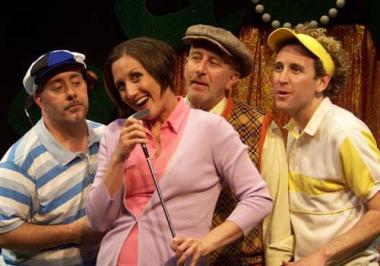In this summer of economic discontent, more theaters are turning to the time-tested ingredients of summer stock: comedies and musicals. I'll be covering a clutch of laff-vehicles next week, but first, three pieces of musical theater that couldn't be more dissimilar, or further from the conventional song-and-dance show.
Candide was a resounding flop when it first opened on Broadway in 1956, but has since become one of Leonard Bernstein's most admired scores and a model of the anti-musical. Based on Voltaire's wickedly cynical 18th-century satire of philosophical optimism and religious hypocrisy, it's a catalogue of war, disaster, crimes and cruelties that test its na?ve young hero's faith in human goodness.
Ralph Petillo's production at the Berkshire Theatre Festival places the action in a school playground. The set, by Erin Kiernan, is a colorful jungle gym and the chorus of BTF interns are uniformed schoolchildren. This is a cute conceit for the play's opening, in which the self-important and lascivious Dr. Pangloss (Ben Rosenblatt) instructs his students that "all's for the best in this best of all possible worlds." But it proves a thin vehicle for the rest of the plot, and seems to encourage a performance style that verges on the cutesy hamminess of a school play.
The young performers are rambunctious and likeable, and a few manage to find more than two dimensions in their archetypal roles. Julia Broder is hilarious as the Old Lady, a crusty Pole with a checkered past and a crafty peasant's eye for the main chance. And McCaela Donovan gives a virtuoso performance as Cunegonde, Candide's sweetheart, a savvy beauty who uses sex to survive—and indulge her taste for rich living—in a violent and greedy world.
One unfortunate casting choice mars the production, because it's at the center. Julian Whitley is trained as a classical singer, not an actor. His Candide is one-dimensional, more ninny than na?f, and he delivers his songs like an operatic recital, in harsh contrast to his colleagues' character singing.
The Warrior Queen
Before the show, director Linda McInerney advises the audience that The Last High Queen of Ireland is still "a first version, in flux." The work-in-progress label also applies to the title character. The play with music, now running in Old Deerfield, explicitly seeks to rehabilitate a forgotten figure of early Irish history, the 11th-century warrior queen Gormlaith—forgotten because she was "merely" the wife of the king, Brian Boru.
A chorus of women, representing the Irish earth and the old, matriarchal religions, confronts Gormlaith, who has taken up arms against her husband, spilling new blood and unraveling the hard-won peace among the medieval clans. She responds that she was driven to it by the king's refusal to treat her as an equal, and tells her side of the story in dreamlike flashbacks.
Talaya Delaney's script is passionate, often poetic, but in this first version it's still rather diffuse. Brian Boru, the cause of Gormlaith's anger, doesn't actually appear until an hour into the 80-minute piece, and we never see a direct conflict between them. Rosemary Caine's original music, played by an eight-piece ensemble, blends Celtic strains with operatic motifs. The most effective musical moments are when the songs weave in and out of the dialogue rather than pausing the action for stand-alone numbers.
Stephanie Carlson leads a large ensemble of local talent. Her Gormlaith is fierce, radiating power and outrage. The play may be a work in progress, but it's given a fully realized, visually splendid production. A circle of stones frames the action, shadow puppets dance on a sail-like curtain, and the very air trembles with ancient curses.
Bye Bye, Birdie
There's a theatrical subgenre that an actor friend of mine calls "affinity musicals"—small-cast shows that delve into a narrow theme and spoof it affectionately. In the past two seasons, the Theater Project has given us mini-musicals about lumberjacks and ice fishing, and now, Golf: The Musical.
This one isn't a book musical with characters and a plot, but a cabaret of songs and sketches. The opening number asks the obvious question—"Why do a show about golf?"—and answers with a Letterman-style countdown leading to Reason Number One: "Lots and lots of jokes about balls."
And there are, plus fart jokes and crotch jokes (on the order of "my husband's little putter") and just plain corny jokes, washed down with painful puns, like "My Husband is Playing a Round." Though there's a paean to Tiger Woods, most of the focus is on, and at the expense of, ordinary weekend duffers. The songs, most of them pastiches of predictable musical styles, are usually clever and often funny. But a couple land with a thud, especially "Let's Bring Golf to the Gulf," an astonishingly offensive number about Iraq, complete with a burkha-clad dancer and lines about noses "like Jamie Farr's."
The four performers give a high-spirited rendition of Michael Roberts' script and songs, under Danny Eaton's direction and Amy Roberts-Crawford's keyboard accompaniment. Luis Manzi has the most impressive singing voice, which he uses to humorous effect in an extended gospel send-up. Lea Oppedisano has the surest comic touch and brings the house down with a Peggy Lee-esque torch song, "Golf's Such a Naughty Game." Darron Cardosa and Bill Nabel also get their licks in, notably in an exchange of hoary one-liners between Hope and Crosby in golfers' heaven.
If you're a golfer you'll probably get, and appreciate, more of the jokes than I did. I do wish more of them were as on-target as Reason Number Two: "There just aren't enough shows for rich white people.""
Candide: through Aug. 15, Berkshire Theatre Festival, East St., Stockbridge, (413) 298-5576, www.berkshiretheatre.org.
The Last High Queen of Ireland: through July 19, Old Deerfield Productions, Reid Theatre, Deerfield Academy, Deerfield, www.cabotix.com or (413) 559-7678.
Golf: The Musical: through Aug. 2, The Theater Project, Majestic Theater, 131 Elm Street, West Springfield, (413) 747-7797, www.majestictheater.com.



